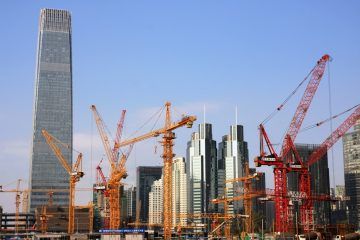John Lanchester in the London Review of Books:
 The People’s Republic of China had its seventieth birthday on 1 October. ‘Sheng ri kuai le’ to the world’s biggest and most populous example of … of … well, actually, that sentence is hard to finish. There’s no off-the-shelf description for China’s political and economic system. ‘Socialism with Chinese characteristics’ is the Chinese Communist Party’s preferred term, but the s-word makes an odd fit with a country that is the world’s most important market for luxury goods, has the second largest number of billionaires, stages the world’s biggest one-day shopping event, ‘Singles’ Day’, and is home to the world’s biggest, fastest-expanding, spendiest, most materially aspirational middle class. Look at the UN’s Human Development Index: after seventy years of communist rule, China’s inequality figures are dramatically worse than those of the UK and even the US. Can we call that ‘socialism’?
The People’s Republic of China had its seventieth birthday on 1 October. ‘Sheng ri kuai le’ to the world’s biggest and most populous example of … of … well, actually, that sentence is hard to finish. There’s no off-the-shelf description for China’s political and economic system. ‘Socialism with Chinese characteristics’ is the Chinese Communist Party’s preferred term, but the s-word makes an odd fit with a country that is the world’s most important market for luxury goods, has the second largest number of billionaires, stages the world’s biggest one-day shopping event, ‘Singles’ Day’, and is home to the world’s biggest, fastest-expanding, spendiest, most materially aspirational middle class. Look at the UN’s Human Development Index: after seventy years of communist rule, China’s inequality figures are dramatically worse than those of the UK and even the US. Can we call that ‘socialism’?
It’s equally hard to claim China as a triumph of capitalism, given the completeness of state control over most areas of life and the extent of its open interventions in the national economy – capital controls, for instance, are a huge no-no in free-market economics, but are central to the way the CCP runs the biggest economy in the world. This system-with-no-name has been extraordinarily successful, with more than 800 million people raised out of absolute poverty since the 1980s. Growth hasn’t slowed down since the global financial crisis – or, as those cheeky scamps at the CCP tend to call it, the Western financial crisis. While the developed world has been struggling with low to no growth, China has grown by more than six per cent a year and a further eighty million mainly rural citizens have been raised out of absolute poverty since 2012. There is a strong claim that this scale of growth, sustained for such an unprecedented number of people over such a number of years, is the greatest economic achievement in human history.
More here.
